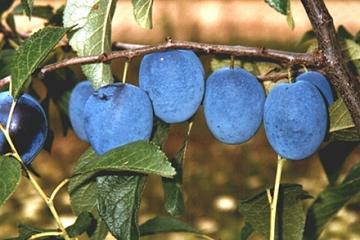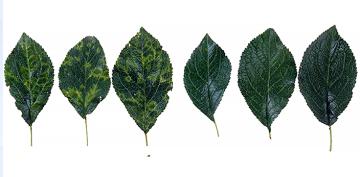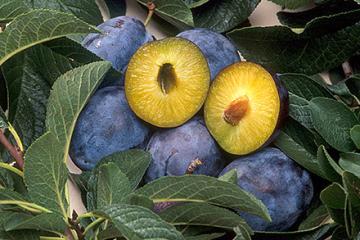ARS Unveils New Disease Resistant Honeysweet Plum

Honeysweet plums still on the tree. (Photo courtesy of Chris Dardick)
Researchers used RNAi technology to create a plum variety that’s resistant to devastating Sharka disease caused by plum pox virus
Meet the Honeysweet Plum: A virus-resistant plum that ARS hopes to bring to market soon. They are large and oblong with a very sweet, flavorful taste.
ARS created the Honeysweet variety using RNAi, a biotechnology method that makes them immune to the plum pox virus. Plum pox infects stone fruit trees: plums, peaches, apricots and cherries. Once infected, the fruit discolors and falls from the tree prior to maturation. There is no natural, genetic resistance to the virus.
Plum pox is devastating, according to Chris Dardick, molecular plant biologist and lead scientist at the ARS Appalachian Fruit Research Laboratory in Kearneysville, WV. Eradicating the virus is costly: infected trees are identified and destroyed, and all trees in a 500-meter area around the infected tree are also destroyed to prevent virus spread.
Growers in the U.S. fear Sharka disease. According to Dardick, “The U.S. prune industry is almost entirely in California. They have the largest, highest quality fruit and they export about 50% of the world’s supply. They don’t have plum pox, but they’re terrified they’re going to get it. “

Left - Susceptible plum infected with PPV displaying classic ringspot symptoms. Right – Honeysweet leaves free from virus. (Photo courtesy of Chris Dardick)
RNAi technology could stop plum pox completely. “Trials in the U.S. and Europe since the 1990s show that these experimental trees are completely resistant to the virus,” said Dardick.
To deploy RNAi technology in Honeysweet, a gene from the plum pox virus was spliced into the plum plant. “This spliced gene acts as sort of antigen against the virus,” said Dardick. “Basically, it’s a genetic vaccine. It’s very effective.”
RNAi technology is also safe. ARS along with numerous cooperators has conducted trials in the U.S. and Europe for the last 20 years, most recently in Romania. “There are no safety concerns that ARS can find,” said Dardick. “In the field, the plants remain very healthy; there’s no break-down of resistance (against plum pox), and there is no evidence of (illness or disease) in animals that have consumed the fruit.” He added, “We have 30 years of data showing RNAi technology is safe and effective. It’s one of the most proven biotechnology strategies for protecting plants from disease.”
The next step is bringing the fruit to market.

These transgenic plums contain a gene that makes them highly resistant to plum pox virus. (Photo by Scott Bauer, K8891-19).
“One of the challenges with the products of biotechnology is that it’s not just the policies of the country you’re growing them in that matters,” said Dardick. “Permissions also have to be granted by the major trading partners. You have to clear the path to market internationally, or the growers will lose large markets.”
In December 2021, Canada approved importing Honeysweet after being petitioned by ARS. “Plum Pox is in Canada,” said Dardick. “It’s endemic there. We’ve also had a few instances in the past where the plum pox virus showed up in Pennsylvania, Michigan, and New York. In Pennsylvania it nearly led to the destruction of their regional stone-fruit industry.”
ARS is also working with a group in Europe who are petitioning the European Union (EU) to allow Honeysweet plums to be grown.
“A number of European growers want to grow Honeysweet,” said Dardick. — Kelly A. Harmon, ARS Office of Communications

